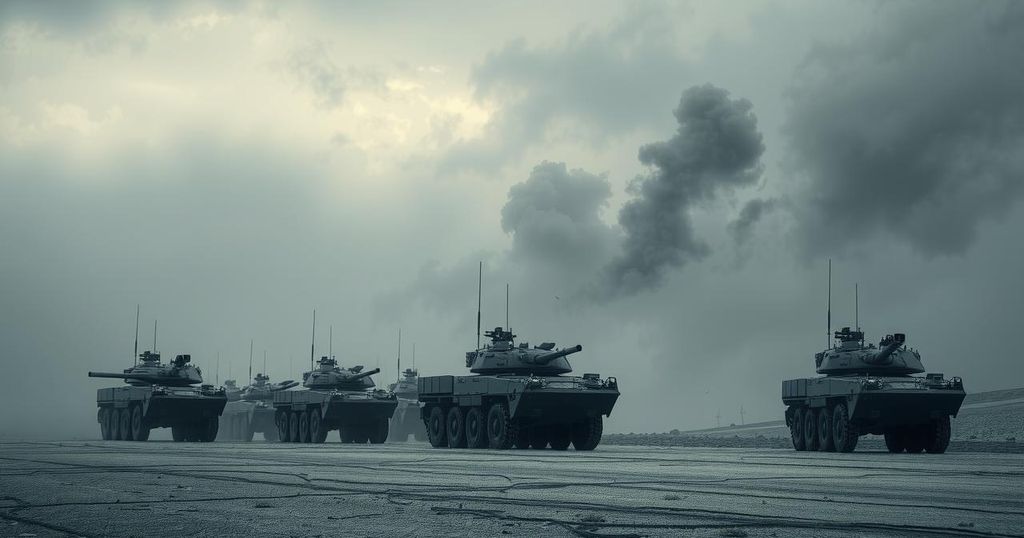North Korea Plans to Send More Troops to Ukraine Amid Geopolitical Tensions
North Korea is reportedly preparing to dispatch more troops to the Ukraine conflict, according to South Korean military officials. This development aligns with former President Trump’s intentions to reconnect with Kim Jong-un. Despite experiencing high casualty rates, North Korea’s regime seems poised to enhance its military support for Russia amid ongoing geopolitical tensions.
Military officials in South Korea have reported that North Korea is preparing to send additional troops to the Ukraine conflict, despite high casualty rates among the soldiers already deployed. This news coincides with former President Donald Trump expressing intent to reconnect with North Korean leader Kim Jong-un, whom he referred to as a “smart guy” in a recent Fox News interview.
The South’s Joint Chiefs of Staff (JCS) stated that following the deployment of approximately 11,000 North Korean soldiers to Ukraine last autumn, many of whom suffered serious injuries or fatalities, Pyongyang appears to be accelerating preparations for further troop dispatches. However, specific follow-up measures were not disclosed by the JCS.
In autumn 2022, North Korea began sending troops to Ukraine in coordination with Russia, following an agreement between Kim Jong-un and Vladimir Putin to enhance their mutual defense against perceived U.S. hegemony. In exchange for sending troops and munitions, North Korea seeks access to advanced Russian military technology, including missile and satellite capabilities.
During his interview, Trump indicated his willingness to reach out to Kim again, highlighting their past relations. He remarked on Obama’s assessment of North Korea as a significant threat, claiming to have addressed the issue during his presidency. Trump stated, “I will, yeah. He liked me.”
The initial summit between Trump and Kim in June 2018 marked a historic moment as they committed to the total denuclearization of the Korean Peninsula. However, subsequent meetings faltered, primarily due to disagreements on sanctions relief related to nuclear disarmament, leading negotiations to stall since 2019.
North Korea’s military participation in the Ukraine conflict has been largely deemed unsuccessful due to the lack of combat experience among its troops. Reports suggest that Ukrainian forces recently captured two North Korean soldiers, one of whom was unaware of the true nature of his deployment, believing it to be a training exercise instead.
Estimates indicate that North Korea has stationed around 11,000 soldiers in Russia’s Kursk region, with South Korean intelligence noting approximately 270 fatalities and about 2,700 injuries among them. While North Korea has not officially confirmed its involvement in Ukraine, both Putin’s acknowledgment and remarks from North Korean officials suggest compliance with international law regarding troop deployment.
The reported potential deployment of additional North Korean troops to the Ukraine conflict emerges amidst a backdrop of a strained geopolitical landscape, marked by heightened tensions between the United States and both North Korea and Russia. North Korea’s military actions are seen within the context of its ongoing alliance with Russia, signed into a mutual defense pact aimed at countering Western influences. Former President Trump’s comments on rekindling his relationship with Kim Jong-un reflect ongoing discussions about U.S.-North Korea relations, which have been characterized by intermittent diplomacy and stalled negotiations since their last substantial talks in 2019. Understanding North Korea’s motives for troop deployment requires comprehension of its geopolitical ambitions and strategies to enhance its military capabilities through alliances with Russia.
In summary, South Korea’s military officials have raised concerns about North Korea’s potential plans to bolster its troop presence in Ukraine despite prior heavy losses. The situation is complicated by Trump’s statements regarding a potential revival of diplomatic relations with Kim Jong-un. As North Korea navigates a precarious military engagement overseas, the implications for regional security and international relations remain significant.
Original Source: www.theguardian.com




Post Comment